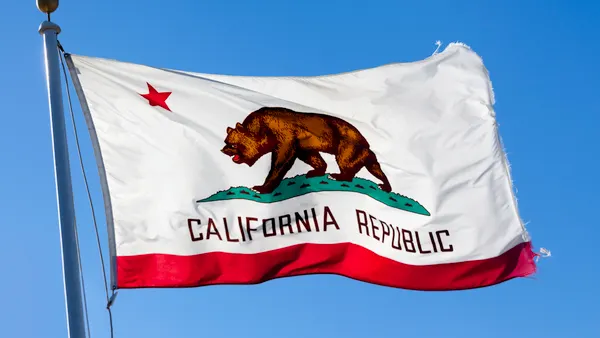Dive Brief:
- A bicameral committee of California state lawmakers released a draft conference report on Monday evening regarding the vulnerability of investor-owned utilities (IOUs) to wildfire damage.
- The report's outline released on Friday included several proposals, including two regarding financing wildfire costs with taxpayer-funded bonds and creating some wiggle room for what the California Public Utilities Commission (CPUC) will take into account to determine reasonableness in preventing utility assets from causing or contributing to a wildfire.
- The outline came exactly one week before the end of this year's legislative session. In a client note based on the outline, analysts at ClearView Energy Partners put the chance of wildfire reform this year at 55%.
Dive Insight:
As the clock ticks on the Californian legislation, the Wildfire Preparedness and Response Conference Committee signaled that lawmakers are ready to back a proposal allowing IOUs to issue recovery bonds and pay off the debt from wildfire damages more gradually, with help from ratepayers.
The funding mechanism would serve to "avoid rate spikes and excessive utility bills" while allowing the CPUC to approve utilities to recover authorized fire-related costs.
The draft report includes language to amend S.B. 901, the vehicle through which committee members were considering a proposal from Democratic Gov. Jerry Brown.
Last week, lawmakers abandoned one of the most controversial portions of Brown's proposal: changing utility fire liability rules and the state's interpretation of "inverse condemnation."
California courts use a "strict liability" interpretation of the doctrine that holds utilities accountable for wildfires caused by their equipment, even if a company is not found negligent.
Pacific Gas & Electric (PG&E) and other large IOUs support updating rules to reduce liabilities for utilities that were not negligent. Reductions would be particularly important for PG&E, which is considering restructuring to protect its assets from wildfire debt. The utility faces $1.59 billion in wildfire costs in the second quarter of 2018 alone.
While California's wildfires are burning anew, the draft outline does not mention whether the proposals would apply to the 2017 or 2018 wildfires. Brown's proposal to ease "inverse condemnation" interpretations would not have applied retroactively to the 2017 fires.
The state legislature has three other bills teed up for votes that could affect utility wildfire liability besides S.B. 901:
- A.B. 33, approved by the state Assembly in May, before Assembly Member Bill Quirk, D, made an amendment to direct the CPUC to issue financing orders to support utility recovery bonds by PG&E, related to the 2017 northern California wildfires. The bill is pending in Senate committee.
- S.B. 819, unanimoulsy approved by Senate in May and ordered last week for a third Assembly reading, seeks to prohibit electric corporations from recovering fines and penalties from damages caused by an electric facility. However, the CPUC would be authorized to grant cost or expense recovery, when negligence is not determined and costs are just and reasonable.
- S.B. 1088, approved by Senate in May and later by Assembly committees, requires utilities to submit reliability plans to the CPUC every two years to address wildfire and other natural disaster risks. The bill authorizes cost recovery for the plan's implementation through rates.
The state legislature could move quickly on S.B. 901 or other legislative items regarding fire liability in the next few days. However, if lawmakers fail to pass any actions, ClearView analysts anticipate that the bicameral committee's report and other efforts "could grease the skids for next session."














